Contents
‐Adding the Disaster Dictionary to “KYODAI HONYAKU!”
![]()
‐Language Grid will be launched in Wikimedia Laboratories
![]()
‐"Live, Multilingual, Intercultural Communication Knowledge Salon:" Connecting Shanghai and Kyoto
![]()
‐Agriculture Aid Project Using the Language Grid, "YMC-Viet Project"
![]()
‐Language Grid Users: HOUSE SAISON Co. Ltd
![]()
‐Message from New Chief Editor
![]()
‐Periodic Maintenance
![]()
Adding the Disaster Dictionary to “KYODAI HONYAKU!”
In April, we started the “Disaster News Translation” project in the “KYODAI HONYAKU!,”
which is the translation service of Kyoto University.
If a foreigner cannot read Japanese News articles, it may be difficult to get accurate information on the present status of a disaster.
Therefore, Ishida & Matsubara Laboratory at Kyoto University is creating the “Disaster Dictionary” for the translation service.
■Creation of the Disaster Dictionary
We continually picked up jargon from news articles, WHO reports, and Wikipedia articles. In addition, we used the Disaster Dictionary provided by the Asia Disaster Reduction Center. More than 10,000 words are registered in the system and can provide accurate translations.
■User Dictionary
Users can collaboratively create a dictionary. Browsing and the modification of words and their translations are possible during the day in which they are created. Registered words and their translations are used by machine translators for a week. Words and their translations that are recognized as useful, however, are permanently introduced into machine translators.
Language Grid will be launched in Wikimedia Laboratories
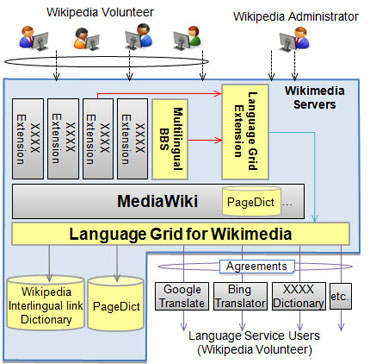
In Wikipedia, an encyclopedia on the Internet operated by Wikimedia Foundation, the distribu-tion of articles in different language versions differs greatly from language to language. For example, there are 3.54 million articles in English, 0.73 million articles in Japanese, and 0.06 mil-lion articles in Thai.
NICT and Kyoto University constructed a multilingual environment using the Language Grid in cooperation with Wikimedia Foundation in order to increase the amount of articles translated into different languages.
A multilingual environment is realized by using the Language Grid, which has been optimized for Wikimedia Foundation’s specifications, and by the development of a multilingual BBS as a Me-diaWiki extension. The BBS can support multilingual discussions between non-native translators and native speakers.
In the future, this trial, including the multilingual BBS, will be available in the research projects of Wikimedia Foundation, and will contribute to the multilingualizing of various Wikimedia projects operated by the Wikimedia Foundation.
"Live, Multilingual, Intercultural Communication Knowledge Salon:" Connecting Shanghai and Kyoto
We started "Live, Multilingual, Intercultural Communication Knowledge Salon," which connects Shanghai and Kyoto via a TV conference system. This salon connects the Advanced Scientific Technology & Management Research Institute of KYOTO and the Kyoto Prefecture Shanghai Business Support Center. The project aim to help small and medium-sized enterprises in Kyoto advance into China, and to attract Chinese enterprises to venture into Japan.
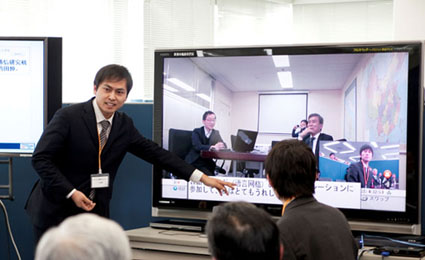
Ms. Rieko Inaba, a lecturer at the Graduate School of Informatics, presided at the opening cer-emony, and we had a demonstration of the Language Grid. When a demo staff in Kyoto gave an address to Kyoto Prefecture Shanghai Business Support Center, a translated Chinese message appeared on the screen in Shanghai, and at the same time a Chinese voice was made audible. Participants in both Shanghai and Kyoto let out a cheer.
From now on this communication salon is expected to facilitate comfortable communication in which people do not feel distance barriers.
Agriculture Aid Project Using the Language Grid, "YMC-Viet Project"
-- Agriculture aid in Vietnam: Overcoming language barriers between Vietnamese youths and Japanese agriculture experts via the Language Grid --
NPO Pangaea has started a youth-driven agricultural aide project in Vietnam called, "YMC-Viet Project." "YMC (Youth Mediated Communication) Model", is a unique model for providing assis-tance to developing nations which was created by NPO Pangaea. In the YMC Model, expert knowledge is delivered to illiterate parents by their children. The YMC-Viet Project is an experi-mental study of the model in the Mekong River Delta in Vietnam. It was conducted as a Ubiquitous Alliance Project of Ministry of Internal Affairs and Communications of Japan with NTT Communications as the prime contractor. In addition, support was given from Vietnamese government. As agriculture experts, the project was also supported by Japanese farmers as well as professors/researchers in the University of Tokyo, Tokyo University of Agriculture, Mie University, and National Agricultural Research Center of Japan.
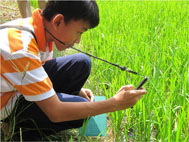
Though Pangaea's "YMC System," Vietnamese youths post questions or troubles in their par-ents' rice paddy with computers at local culture center or cell phones in Vietnamese language. Because they compose those messages by clicking pre-defined texts, new users in the Mekong-delta can post them easily. In the Language Grid, a variety of language resources in the agriculture domain are registered, such as dictionaries and parallel texts in the Japanese, Vietnamese and English languages. Agriculture experts answer to the youths' questions in Japanese and youths can read them in Vietnamese via Language Grid. As well as agriculture experts, we had staff members called "Bridgers." A Bridger plays a text-smoothing role in order to modify the machine-translated experts' texts into youth-friendly answer messages.
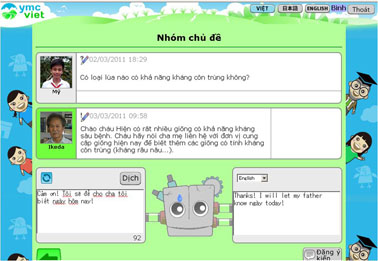
Also, a stack of agriculture knowledge cards with full of pictures and diagrams was prepared to help youths explain the knowledge smoothly to their parents at home. At a post-interview, a youth participant said, "I really enjoyed getting replies from Japanese experts. I would like to become an agriculture expert in the future!"
This project also revealed some technical issues. For instance, the YMC System allows youths to post a comment message by typing via keyboard, but it is difficult for some youths to type in a tonal alphabet. For example, they may want such character as "a," but they tend to type as "a" instead. It causes incorrect translation result via machine translation. We hope to take steps in order to solve these issues with the Language Grid team. In Pangaea, we are seeking to apply YMC Model to other expert domain or language areas in order to get the best out of the Language Grid infrastructure. (Toshiyuki Takasaki, NPO Pangaea)
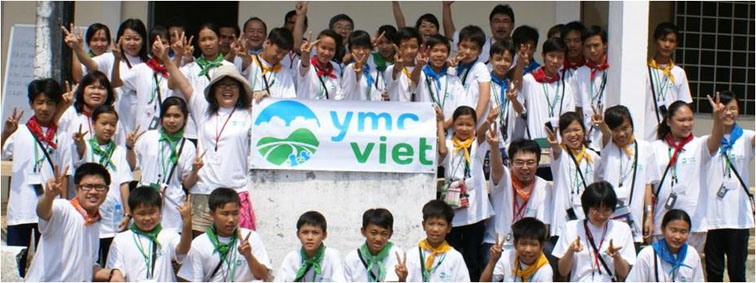
Language Grid Users: HOUSE SAISON Co. Ltd
HOUSE SAISON Co. Ltd uses the Language Grid to support foreign student life in Japan. The International Relations Office of Kyoto City suggested starting the Kyoto Intercultural Collabo-ration Conference. HOUSE SAISON created a "multilingual housing information Q&A system for foreign students" and another system to show the contents of the Q&A system on stores. The Q&A system is an extension of the Language Grid Toolbox. Also, HOUSE SAISON has created a bilingual dictionary with 1500 words common to the acquisition of housing.
Furthermore HOUSE SAISON created usage examples of the Language Grid for foreign stu-dents' currently living at dormitories in cooperation with the Semantic Communication Lab (Kuwa-bara Lab), Department of Information and Communication Science, College of Information Science and Engineering, and Ritsumeikan University. The goal is to help foreign students rent a private rental apartment easily when they leave their dormitories.
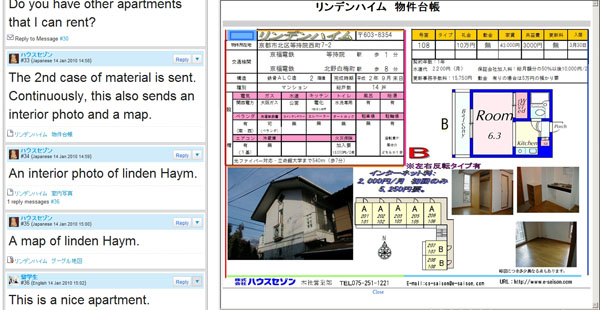
Message from New Chief Editor
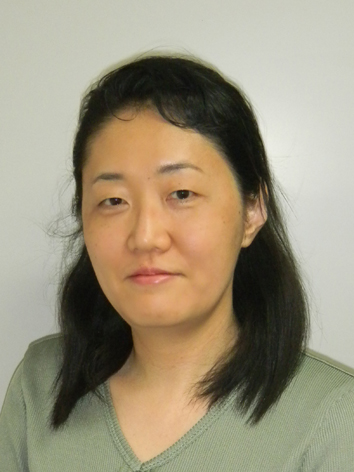
Hello everyone! My name is Yoko Kubota, and I'm the third chief editor of the newsletter, having taken over from former editors Ms. Tsunokawa and Ms. Miyaguchi.
It has been exactly 3 years since the first issue was published on July 1st, 2008. During the past 3 years, Language Grid users have increased from 50 organizations from 8 countries to 139 organizations from 16 countries. We continue our goal to spread the use of the Language Grid all over the world.
We would like to share useful information and activities. We thank you for reading and appreciate your continued support.
Periodic Maintenance
Periodic maintenance will be carried out below. If you wish to use the Language Grid during this period, please contact us in advance at operation [at] langrid.org.
‐August 1st, Monday/ from 18:00 to 21:00 (JST)
‐September 5th, Monday/ from 18:00 to 21:00 (JST)

